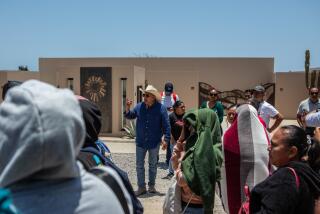Inside China’s angry villages
AT A ROADSIDE store across the street from a kindergarten in Panlong village, a local man sat beside his motorcycle having a soft drink and chatting with a visiting reporter on the recent violence the village had experienced.
“Does political power really come from the barrel of a gun?” he asked, questioning Chairman Mao’s famous dictum. “Is the gun pointed at the enemy or at the people?”
Such talk seems out of place in Panlong, in the heart of the Pearl River Delta. The delta is in southern Guangdong province, one of China’s wealthiest, most industrialized regions. The Cantonese focus on making money instead of talking politics, and their resistance to central government control, is aptly summed up in the popular saying, “The sky is high and the emperor far away.”
But Panlong is just the latest village in Guangdong to be racked by violent protests. Peasants blocked a highway to protest what they saw as inadequate compensation for land seized from them by the government. Riot police broke up the demonstration. Similar clashes erupted in December in Dongzhou village and last summer in Taishi village.
Is Guangdong’s turbulent present a preview of the rest of the country’s future? One recent academic study found that as industrialization and urbanization increase the demand for rural land, developed coastal provinces like Guangdong are increasingly becoming the site of violent clashes over land-use rights.
And unrest is clearly on the rise in China as a whole. There were 87,000 civil disturbances last year -- 238 a day -- compared with just 8,700 in 1993, according to police statistics. Many involve peasants protesting the confiscation of their land for development purposes, but they are often equally angry about environmental degradation and official corruption. Protests by the urban poor against large-scale layoffs and predatory developers are common.
The rural clashes are evidence of the government’s failure to allow farmers the means to resolve their grievances through the press or the courts. They also bespeak a failure of the government’s standard tactic for quelling mass dissent: punishing protest organizers while buying off rank-and-file demonstrators with concessions.
In the villages, it’s not hard to see the tension below the calm surface. Police and security agents sit in booths at the entrances to Panlong and Taishi, although most people can enter during the day. Dongzhou reportedly remains surrounded by checkpoints where police search vehicles for fugitives.
But villagers are obviously fearful about telling their story to outsiders. Panlong locals speak of being hauled off to lengthy government-run “meetings” or “classes” aimed at forcing them to maintain silence about the clashes. Some village residents say police tap their phones. Chinese media have largely been barred from reporting on the clashes, and the local government has declined requests by foreign journalists to travel to these villages. I entered Panlong and Taishi freely but was picked up by police on my way out of both villages. Authorities deleted my digital pictures of Taishi. Reporting without official permission remains illegal in China.
Over the Chinese New Year, state-run television showed pictures of President Hu Jintao frying rice cakes in the impoverished old revolutionary base of Yan’an. His message was that China will build a prosperous “new socialist countryside” by investing in rural infrastructure and basic public services.
About time, say Chinese economists and rural experts, who have suggested such measures for years. Peasants account for two-thirds of China’s population yet receive just 20% of all medical services and similarly low percentages of education and social security spending. Correcting this imbalance without offending urbanites will be a delicate task, to say the least.
Even if spending in rural regions is increased, much of it is unlikely to filter down to the peasants, given the endemic state of official corruption. Chinese experts are pessimistic about the central government’s willingness to break the entrenched alliance of local business interests and corrupt officials. Until that happens, local officials will continue to pocket bribes in exchange for giving state-owned land to developers at cut-rate prices, leaving farmers landless, destitute and angry.
The government could do a lot to alleviate rural tensions by increasing farmers’ rights: the right to move to the cities without being denied the same benefits as urban dwellers; the right to form farmers’ associations to protect their interests; and the right to recall elected village officials who fail to represent those interests. Last year, residents of Taishi tried to exercise that very right, which is already enshrined in national law. The government responded with riot police.
More to Read
Start your day right
Sign up for Essential California for news, features and recommendations from the L.A. Times and beyond in your inbox six days a week.
You may occasionally receive promotional content from the Los Angeles Times.






